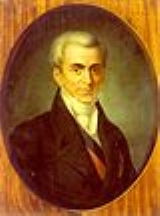
List of Presidents of Greece
Encyclopedia
This is a list of the heads of state of Greece
, from the international recognition of autonomy of the modern nation state in 1828, during the last stages of the Greek War of Independence
, until the present day.
First Hellenic Republic
After the assassination of Ioannis Kapodistrias the country was plunged into chaos and anarchy. Following the resignation of Augustinos Kapodistrias, a series of collective governing councils were established, but their authority was often only nominal.
After the death of Alexander the succession proved problematic, as the Venizelist
government at first favoured Alexander's younger brother Paul
. As Paul refused to pass by his father Constantine
and his elder brother George
, the government as a whole acted as head of state until the election of admiral Kountouriotis as regent.
The new government held a plebiscite
, which resulted in an overwhelming majority for the return of King Constantine I.
Admiral Kountouriotis became regent for a second time from 19 December 1923 until 24 March 1924. The next day the parliament declared the country a Republic and Kountouriotis became provisional president.
Second Hellenic Republic
Kingdom of Greece
Military Dictatorship
The regime of the colonels
was established in a military coup led by Colonel Georgios Papadopoulos on 21 April 1967. When King Constantine II went into exile on 13 December, his constitutional role was assumed by regents appointed by the military junta.
On 1 June 1973 the junta abolished the monarchy and replaced it with a presidential republic.
was overthrown and democracy restored. A second referendum
, held on 8 December 1974, confirmed the abolition of the monarchy and the establishment of the current parliamentary republic
, with the President of the Republic
as the head of state.
Greece
Greece , officially the Hellenic Republic , and historically Hellas or the Republic of Greece in English, is a country in southeastern Europe....
, from the international recognition of autonomy of the modern nation state in 1828, during the last stages of the Greek War of Independence
Greek War of Independence
The Greek War of Independence, also known as the Greek Revolution was a successful war of independence waged by the Greek revolutionaries between...
, until the present day.
First Hellenic RepublicFirst Hellenic RepublicThe First Hellenic Republic is a name used to refer to the provisional Greek state during the Greek War of Independence against the Ottoman Empire...
(1828-1832)
| Governor | Picture | Life | Term of office | Comments |
|---|---|---|---|---|
| Ioannis Kapodistrias Ioannis Kapodistrias Count Ioannis Antonios Kapodistrias |Academy of Athens]] Critical Observations about the 6th-Grade History Textbook"): "3.2.7. Σελ. 40: Δεν αναφέρεται ότι ο Καποδίστριας ήταν Κερκυραίος ευγενής." "...δύο ιστορικούς της Aκαδημίας κ.κ... |
1776–1831 | 24 January 1828- 9 October 1831 |
Assassinated in 1831. | |
| Augustinos Kapodistrias Augustinos Kapodistrias Count Augustinos Ioannis Maria Kapodistrias was a Greek soldier and politician. He was born in Corfu. Kapodistrias was the younger brother of Ioannis Kapodistrias, first Governor of Greece... |
1778–1857 | 9 October 1831- 9 April 1832 |
President of the Provisional Government Commission. |
After the assassination of Ioannis Kapodistrias the country was plunged into chaos and anarchy. Following the resignation of Augustinos Kapodistrias, a series of collective governing councils were established, but their authority was often only nominal.
| Governing Council | Life | Term of office | Comments |
|---|---|---|---|
| Theodoros Kolokotronis Theodoros Kolokotronis Theodoros Kolokotronis was a Greek Field Marshal and one of the leaders of the Greek War of Independence against the Ottoman Empire.... , Andreas Zaimis Andreas Zaimis Andreas Asimakou Zaimis was a Greek freedom fighter and government leader during the Greek War of Independence.Born in Kalavryta, in the northern Peloponnesos, Zaimis was a leader of armed men who fought the Ottoman Turks, ultimately securing Greece's freedom.In 1826, Zaimis was chosen as the... , Ioannis Kolettis Ioannis Kolettis Ioannis Kolettis was a Greek politician who played a significant role in Greek affairs from the Greek War of Independence through the early years of the Greek Kingdom, including as Minister to France and serving twice as Prime Minister.... , Andreas Metaxas Andreas Metaxas Andreas Metaxas was a Greek politician born on the island of Cephalonia.During the latter part of the War of Independence he accompanied Kapodistrias to Greece, and was appointed by him Minister of War... , Vasilios Boudouris |
9 April 1832- 14 April 1832 |
||
| Georgios Kountouriotis Georgios Kountouriotis Georgios Kountouriotis was a Greek ship-owner and politician who served as prime minister from March to October 1848. He was born in 1782 on the Saronic island of Hydra to an Arvanite family... , Ioannis Kolettis Ioannis Kolettis Ioannis Kolettis was a Greek politician who played a significant role in Greek affairs from the Greek War of Independence through the early years of the Greek Kingdom, including as Minister to France and serving twice as Prime Minister.... , Andreas Metaxas Andreas Metaxas Andreas Metaxas was a Greek politician born on the island of Cephalonia.During the latter part of the War of Independence he accompanied Kapodistrias to Greece, and was appointed by him Minister of War... , Andreas Zaimis Andreas Zaimis Andreas Asimakou Zaimis was a Greek freedom fighter and government leader during the Greek War of Independence.Born in Kalavryta, in the northern Peloponnesos, Zaimis was a leader of armed men who fought the Ottoman Turks, ultimately securing Greece's freedom.In 1826, Zaimis was chosen as the... , Dimitrios Plapoutas, Dimitrios Ypsilantis (d.17 Aug.1832), Konstantinos Botsaris (from 25 April 1832) |
14 April 1832- 3 October 1832 |
||
| Andreas Zaimis Andreas Zaimis Andreas Asimakou Zaimis was a Greek freedom fighter and government leader during the Greek War of Independence.Born in Kalavryta, in the northern Peloponnesos, Zaimis was a leader of armed men who fought the Ottoman Turks, ultimately securing Greece's freedom.In 1826, Zaimis was chosen as the... , Andreas Metaxas Andreas Metaxas Andreas Metaxas was a Greek politician born on the island of Cephalonia.During the latter part of the War of Independence he accompanied Kapodistrias to Greece, and was appointed by him Minister of War... , Ioannis Kolettis Ioannis Kolettis Ioannis Kolettis was a Greek politician who played a significant role in Greek affairs from the Greek War of Independence through the early years of the Greek Kingdom, including as Minister to France and serving twice as Prime Minister.... |
3 October 1832- 6 February 1833 |
House of Wittelsbach (1832-1862)
| King | Picture | Life | Reign | Comments |
|---|---|---|---|---|
| Otto Otto of Greece Otto, Prince of Bavaria, then Othon, King of Greece was made the first modern King of Greece in 1832 under the Convention of London, whereby Greece became a new independent kingdom under the protection of the Great Powers .The second son of the philhellene King Ludwig I of Bavaria, Otto ascended... |
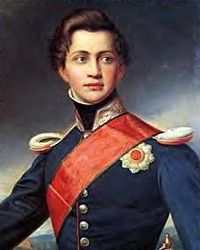 |
1815–1867 | 6 February 1833- 23 October 1862 |
Until 13 June 1835 with a regency council consisting of ministers Josef Ludwig von Armansperg Josef Ludwig von Armansperg Josef Ludwig, Graf von Armansperg served as the Interior and Finance Minister and Foreign and Finance Minister under King Ludwig I of Bavaria in the government of Bavaria... (president), Karl von Abel Karl von Abel Karl von Abel was a Bavarian statesman.Born in Wetzlar, Abel was the son of a procurator at the superior Court of Justice... and Georg Ludwig von Maurer Georg Ludwig von Maurer Georg Ludwig Maurer, since 1831 Georg Ludwig von Maurer was a German statesman and legal historian.-Biography:Maurer was born at Erpolzheim, near Dürkheim as the son of a Protestant pastor.... . Deposed in 1862. |
| Regency Council | 23 October 1862- 30 March 1863 |
Collective regency pending the election of a new king. |
House of Schleswig-Holstein-Sonderburg-Glücksburg (1863-1924)
| King | Picture | Life | Reign | Comments |
|---|---|---|---|---|
| George I George I of Greece George I was King of Greece from 1863 to 1913. Originally a Danish prince, George was only 17 years old when he was elected king by the Greek National Assembly, which had deposed the former king Otto. His nomination was both suggested and supported by the Great Powers... |
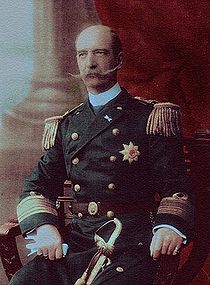 |
1845–1913 | 30 October 1863- 18 March 1913 |
Assassinated. |
| Constantine I Constantine I of Greece Constantine I was King of Greece from 1913 to 1917 and from 1920 to 1922. He was commander-in-chief of the Hellenic Army during the unsuccessful Greco-Turkish War of 1897 and led the Greek forces during the successful Balkan Wars of 1912–1913, in which Greece won Thessaloniki and doubled in... |
 |
1868–1923 | 18 March 1913- 11 June 1917 |
Went into exile and abdicated in 1917 in favour of his second son Alexander. |
| Alexander Alexander of Greece Alexander reigned as King of Greece from 1917 to 1920 until his unusual death as the result of sepsis contracted by being bitten by two monkeys.-Early life:... |
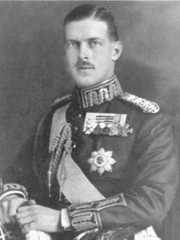 |
1893–1920 | 11 June 1917- 25 October 1920 |
Died in office. |
After the death of Alexander the succession proved problematic, as the Venizelist
Venizelism
Venizelism was one of the major political movements in Greece from the 1900s until the mid 1970s.- Ideology :Named after Eleftherios Venizelos, the key characteristics of Venizelism were:*Opposition to Monarchy...
government at first favoured Alexander's younger brother Paul
Paul of Greece
Paul reigned as King of Greece from 1947 to 1964.-Family and early life:Paul was born in Athens, the third son of King Constantine I of Greece and his wife, Princess Sophia of Prussia. He was trained as a naval officer....
. As Paul refused to pass by his father Constantine
Constantine I of Greece
Constantine I was King of Greece from 1913 to 1917 and from 1920 to 1922. He was commander-in-chief of the Hellenic Army during the unsuccessful Greco-Turkish War of 1897 and led the Greek forces during the successful Balkan Wars of 1912–1913, in which Greece won Thessaloniki and doubled in...
and his elder brother George
George II of Greece
George II reigned as King of Greece from 1922 to 1924 and from 1935 to 1947.-Early life, first period of kingship and exile:George was born at the royal villa at Tatoi, near Athens, the eldest son of King Constantine I of Greece and his wife, Princess Sophia of Prussia...
, the government as a whole acted as head of state until the election of admiral Kountouriotis as regent.
| Regent | Picture | Life | Term of office | Comments |
|---|---|---|---|---|
| Admiral Pavlos Kountouriotis Pavlos Kountouriotis Pavlos Kountouriotis was a Greek admiral and naval hero during the Balkan Wars and the first and third President of the Second Hellenic Republic.-Family Background:The Kountouriotes was a prominent Arvanite family from the island of Hydra... |
 |
1855–1935 | 28 October 1920- 17 November 1920 |
Resigned after the electoral defeat Greek legislative election, 1920 The legislative elections of 1920 were probably the most crucial elections in the modern history of Greece, influencing not only the few years afterwards, including Greece's defeat by Kemal Atatürk's reformed Turkish army in 1922, but setting the stage for Greece's political landscape for most of... of the Venizelists. |
| Queen Mother Olga Olga Konstantinovna of Russia Grand Duchess Olga Constantinovna of Russia , later Queen Olga of the Hellenes , was the queen consort of King George I of Greece and briefly in 1920, Queen Regent of Greece... |
 |
1851–1926 | 17 November 1920- 19 December 1920 |
The new government held a plebiscite
Greek plebiscite, 1920
The Greek plebiscite of 22 November 1920 was held on the issue of the return of exiled King Constantine I following the death of his son, King Alexander. The plebiscite ensured and affirmed the dominance of the anti-Venizelist camp in the country...
, which resulted in an overwhelming majority for the return of King Constantine I.
| King | Picture | Life | Reign | Comments |
|---|---|---|---|---|
| Constantine I Constantine I of Greece Constantine I was King of Greece from 1913 to 1917 and from 1920 to 1922. He was commander-in-chief of the Hellenic Army during the unsuccessful Greco-Turkish War of 1897 and led the Greek forces during the successful Balkan Wars of 1912–1913, in which Greece won Thessaloniki and doubled in... |
 |
1868–1923 | 19 December 1920- 27 September 1922 |
Abdicated again in 1922 after the Asia Minor Disaster. |
| George II George II of Greece George II reigned as King of Greece from 1922 to 1924 and from 1935 to 1947.-Early life, first period of kingship and exile:George was born at the royal villa at Tatoi, near Athens, the eldest son of King Constantine I of Greece and his wife, Princess Sophia of Prussia... |
 |
1890–1947 | 27 September 1922- 25 March 1924 |
Exiled on 19 December 1923, deposed on 25 March 1924. |
Admiral Kountouriotis became regent for a second time from 19 December 1923 until 24 March 1924. The next day the parliament declared the country a Republic and Kountouriotis became provisional president.
Second Hellenic RepublicSecond Hellenic RepublicThe Second Hellenic Republic is the term used to describe the political regime of Greece from 1924 to 1935. It followed from the period of the constitutional monarchy under the monarchs of the House of Glücksburg, and lasted until its overthrow in a military coup d'état which restored the monarchy...
(1924-1935)
| President | Picture | Life | Term of office | Comments |
|---|---|---|---|---|
| Admiral Pavlos Kountouriotis Pavlos Kountouriotis Pavlos Kountouriotis was a Greek admiral and naval hero during the Balkan Wars and the first and third President of the Second Hellenic Republic.-Family Background:The Kountouriotes was a prominent Arvanite family from the island of Hydra... |
 |
1855–1935 | 25 March 1924- 15 March 1926 |
Elected by Parliament, resigned over General Pangalos Theodoros Pangalos (general) Major General Theodoros Pangalos was a Greek soldier and politician. A distinguished staff officer and an ardent Venizelist and anti-royalist, Pangalos played a leading role in the September 1922 revolt that deposed King Constantine I and in the establishment of the Second Hellenic Republic... ' dictatorship. |
| General Theodoros Pangalos Theodoros Pangalos (general) Major General Theodoros Pangalos was a Greek soldier and politician. A distinguished staff officer and an ardent Venizelist and anti-royalist, Pangalos played a leading role in the September 1922 revolt that deposed King Constantine I and in the establishment of the Second Hellenic Republic... |
 |
1878–1952 | 15 March 1926- 22 August 1926 |
Military dictator, self-appointed President, overthrown by minister Georgios Kondylis Georgios Kondylis Georgios Kondylis was a general of the Greek army and Prime Minister of Greece. He was nicknamed Keravnos, Greek for "Thunder" or "Thunderbolt".-Military career:... . |
| Admiral Pavlos Kountouriotis Pavlos Kountouriotis Pavlos Kountouriotis was a Greek admiral and naval hero during the Balkan Wars and the first and third President of the Second Hellenic Republic.-Family Background:The Kountouriotes was a prominent Arvanite family from the island of Hydra... |
 |
1855–1935 | 24 August 1926- 9 December 1929 |
Restored to office by Kondylis Georgios Kondylis Georgios Kondylis was a general of the Greek army and Prime Minister of Greece. He was nicknamed Keravnos, Greek for "Thunder" or "Thunderbolt".-Military career:... , re-elected in 1929, resigned due to ill health. |
| Alexandros Zaimis Alexandros Zaimis Alexandros Zaimis was a former Greek Prime Minister, Minister of the Interior, Minister of Justice, and High Commissioner of Crete. He served as Prime Minister six times.-Early Life and Family:... |
1855–1936 | 10 December 1929- 10 October 1935 |
Overthrown by military revolt. |
Kingdom of GreeceKingdom of GreeceThe Kingdom of Greece was a state established in 1832 in the Convention of London by the Great Powers...
(1935-1973)
| Regent | Picture | Life | Term of office | Comments |
|---|---|---|---|---|
| Georgios Kondylis Georgios Kondylis Georgios Kondylis was a general of the Greek army and Prime Minister of Greece. He was nicknamed Keravnos, Greek for "Thunder" or "Thunderbolt".-Military career:... |
1879–1936 | 10 October 1935- 25 November 1935 |
Appointed himself Regent pending the return of King George II George II of Greece George II reigned as King of Greece from 1922 to 1924 and from 1935 to 1947.-Early life, first period of kingship and exile:George was born at the royal villa at Tatoi, near Athens, the eldest son of King Constantine I of Greece and his wife, Princess Sophia of Prussia... . |
House of Schleswig-Holstein-Sonderburg-Glücksburg (1935-1973)
| King | Picture | Life | Reign | Comments |
|---|---|---|---|---|
| George II George II of Greece George II reigned as King of Greece from 1922 to 1924 and from 1935 to 1947.-Early life, first period of kingship and exile:George was born at the royal villa at Tatoi, near Athens, the eldest son of King Constantine I of Greece and his wife, Princess Sophia of Prussia... |
 |
1890–1947 | 25 November 1935- 1 April 1947 |
Fled the country in May 1941 during the German invasion. After the liberation and before his return Archbishop Damaskinos of Athens was Regent from 31 December 1944 until 27 September 1946. Died childless and was succeeded by his younger brother Paul. |
| Paul Paul of Greece Paul reigned as King of Greece from 1947 to 1964.-Family and early life:Paul was born in Athens, the third son of King Constantine I of Greece and his wife, Princess Sophia of Prussia. He was trained as a naval officer.... |
1901–1964 | 1 April 1947- 6 March 1964 |
Succeeded by his son Constantine. | |
| Constantine II Constantine II of Greece |align=right|Constantine II was King of Greece from 1964 until the abolition of the monarchy in 1973, the sixth and last monarch of the Greek Royal Family.... |
1940– | 6 March 1964- 1 June 1973 |
Went into exile on 13 December 1967 after a failed counter-coup against the military regime Greek military junta of 1967-1974 The Greek military junta of 1967–1974, alternatively "The Regime of the Colonels" , or in Greece "The Junta", and "The Seven Years" are terms used to refer to a series of right-wing military governments that ruled Greece from 1967 to 1974... ruling since 21 April 1967. |
Military DictatorshipGreek military junta of 1967-1974The Greek military junta of 1967–1974, alternatively "The Regime of the Colonels" , or in Greece "The Junta", and "The Seven Years" are terms used to refer to a series of right-wing military governments that ruled Greece from 1967 to 1974...
(1967-1974)
The regime of the colonelsGreek military junta of 1967-1974
The Greek military junta of 1967–1974, alternatively "The Regime of the Colonels" , or in Greece "The Junta", and "The Seven Years" are terms used to refer to a series of right-wing military governments that ruled Greece from 1967 to 1974...
was established in a military coup led by Colonel Georgios Papadopoulos on 21 April 1967. When King Constantine II went into exile on 13 December, his constitutional role was assumed by regents appointed by the military junta.
| Regent | Picture | Life | Term of office | Comments |
|---|---|---|---|---|
| General Georgios Zoitakis Georgios Zoitakis Georgios Zoitakis was a Greek Army general and regent of Greece from 13 December 1967 to 21 March 1972, during the period of the military regime of the Colonels.- Life :... |
 |
1910–1996 | 13 December 1967- 21 March 1972 |
Appointed by the military junta. Eventually replaced by Colonel Papadopoulos. |
| Colonel Georgios Papadopoulos |
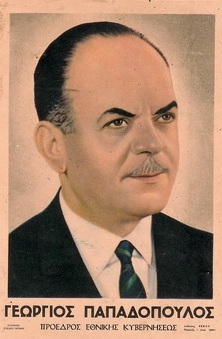 |
1919–1999 | 21 March 1972- 31 May 1973 |
Abolished the monarchy and declared himself President after a controversial referendum. |
On 1 June 1973 the junta abolished the monarchy and replaced it with a presidential republic.
| President | Picture | Life | Term of office | Comments |
|---|---|---|---|---|
| Colonel Georgios Papadopoulos |
 |
1919–1999 | 1 June 1973- 25 November 1973 |
Deposed in a coup led by Brigadier Dimitrios Ioannides Dimitrios Ioannides Dimitrios Ioannidis , also known as Dimitris Ioannidis, was a Greek military officer and one of the leading figures in the Greek military junta of 1967–1974.He was born in Athens to a wealthy, upper middle-class business family with roots in Epirus.... . |
| General Phaedon Gizikis Phaedon Gizikis Phaedon Gizikis was a Greek Army officer and President of Greece from 1973 to 1974.Born on 16 June 1917, in Volos, Greece, Phaedon Gizikis was a career Greek army officer... |
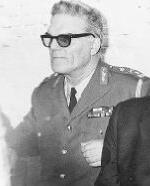 |
1917–1999 | 25 November 1973- 17 December 1974 |
Appointed by Brigadier Ioannides, remained transitional President after the fall of the regime Metapolitefsi The Metapolitefsi was a period in Greek history after the fall of the Greek military junta of 1967–1974 that includes the transitional period from the fall of the dictatorship to the Greek legislative elections of 1974 and the democratic period immediately after these elections.The long... . |
Third Hellenic Republic (since 1974)
In 1974, the military juntaGreek military junta of 1967-1974
The Greek military junta of 1967–1974, alternatively "The Regime of the Colonels" , or in Greece "The Junta", and "The Seven Years" are terms used to refer to a series of right-wing military governments that ruled Greece from 1967 to 1974...
was overthrown and democracy restored. A second referendum
Greek plebiscite, 1974
The Greek plebiscite of December 8, 1974, resulted in the final abolition of the monarchy in Greece and the establishment of the current Third Hellenic Republic....
, held on 8 December 1974, confirmed the abolition of the monarchy and the establishment of the current parliamentary republic
Parliamentary republic
A parliamentary republic or parliamentary constitutional republic is a type of republic which operates under a parliamentary system of government - meaning a system with no clear-cut separation of powers between the executive and legislative branches. There are a number of variations of...
, with the President of the Republic
President of Greece
The President of the Hellenic Republic , colloquially referred to in English as the President of Greece, is the head of state of Greece. The office of the President of the Republic was established after the Greek republic referendum, 1974 and formally by the Constitution of Greece in 1975. The...
as the head of state.
| President | Picture | Life | Term of office | Comments |
|---|---|---|---|---|
| Michail Stasinopoulos Michail Stasinopoulos Michael Stasinopoulos was a Greek politician. He served as the interim President of the Third Hellenic Republic between 18 December 1974 and 19 June 1975.-Biography:... |
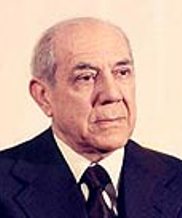 |
1903–2002 | 18 December 1974- 19 June 1975 |
1st President (pro tempore Pro tempore Pro tempore , abbreviated pro tem or p.t., is a Latin phrase which best translates to "for the time being" in English. This phrase is often used to describe a person who acts as a locum tenens in the absence of a superior, such as the President pro tempore of the United States Senate.Legislative... ). Elected by parliament with 206 votes |
| Constantine Tsatsos | 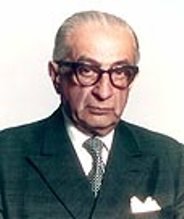 |
1899–1987 | 20 June 1975- 15 May 1980 |
2nd President Supported by the New Democracy New Democracy (Greece) New Democracy is the main centre-right political party and one of the two major parties in Greece. It was founded in 1974 by Konstantinos Karamanlis and formed the first cabinet of the Third Hellenic Republic... party, elected by parliament with 210 votes |
| Konstantinos Karamanlis | 1907–1998 | 15 May 1980- 10 March 1985 |
3rd President (first term) Supported by the New Democracy New Democracy (Greece) New Democracy is the main centre-right political party and one of the two major parties in Greece. It was founded in 1974 by Konstantinos Karamanlis and formed the first cabinet of the Third Hellenic Republic... party, elected by parliament with 183 votes on the third ballot |
|
| Ioannis Alevras Ioannis Alevras Ioannis Alevras was a Greek Panhellenic Socialist Movement politician and Speaker of the Hellenic Parliament.-Syndicalist:... |
 |
1912–1995 | 10 March 1985- 30 March 1985 |
Speaker of Parliament acting as President pro tempore Pro tempore Pro tempore , abbreviated pro tem or p.t., is a Latin phrase which best translates to "for the time being" in English. This phrase is often used to describe a person who acts as a locum tenens in the absence of a superior, such as the President pro tempore of the United States Senate.Legislative... |
| Christos Sartzetakis Christos Sartzetakis Christos Sartzetakis is a Greek jurist and former supreme justice of the Court of Cassation , who served as the fourth President of the Third Hellenic Republic from 1985 to 1990. He was born in Neapoli, Thessaloniki in 1929... |
 |
1929– | 30 March 1985- 4 May 1990 |
4th President Supported by the PASOK party, elected by parliament with 180 votes on the third ballot |
| Konstantinos Karamanlis | 1907–1998 | 5 May 1990- 10 March 1995 |
5th President (second term) Supported by the New Democracy New Democracy (Greece) New Democracy is the main centre-right political party and one of the two major parties in Greece. It was founded in 1974 by Konstantinos Karamanlis and formed the first cabinet of the Third Hellenic Republic... party, elected by parliament with 153 votes on the fifth ballot |
|
| Konstantinos Stephanopoulos | 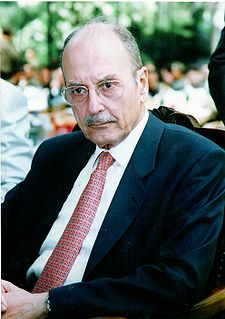 |
1926– | 10 March 1995- 12 March 2005 |
6th President (two terms) Supported by the Political Spring Political Spring Political Spring is a former Greek conservative political party founded in June 1993 by Antonis Samaras. The party was formed after Antonis Samaras broke away from the New Democracy after being dismissed as Foreign Minister over the Macedonian question.... and PASOK parties, elected by parliament with 181 votes on the third ballot. Re-elected with 269 votes on the first ballot |
| Karolos Papoulias Karolos Papoulias -Honours:*Knight Grand Cross with Grand Cordon of the Order of Merit of the Italian Republic *Knight Grand Cross of the Grand Order of King Tomislav *Knight of the Order of the Elephant- External links :*... |
1929– | 12 March 2005- Incumbent |
7th President (two terms) Supported by the New Democracy New Democracy (Greece) New Democracy is the main centre-right political party and one of the two major parties in Greece. It was founded in 1974 by Konstantinos Karamanlis and formed the first cabinet of the Third Hellenic Republic... and PASOK parties, elected by parliament with 279 votes on the first ballot. Re-elected with 266 votes on the first ballot |
See also
- Politics of GreecePolitics of GreeceThe Politics of Greece takes place in a large parliamentary representative democratic republic, whereby the Prime Minister of Greece is the head of government, and of a multi-party system. Legislative power is vested in both the government and the Hellenic Parliament...
- List of Prime Ministers of Greece
- Rulers of GreeceRulers of Greece-Antiquity:*Kings of Sparta*Kings of Athens*Archons of Athens*Kings of Macedon*Kings of Pontus*Kings of Paionia*Roman Emperors* Kings of Kommagene* Kings of Lydia* Attalid Kings of Pergamon-Middle Ages:*Byzantine Emperors*Emperors of Nicaea...
- Lists of office-holders of all nations

